In this article:
Skin health is often the first thing people notice and associate with overall health. Therefore, it is common to want radiant, taut, and clear skin. However, various factors, including lifestyle, environment, and age, can cause loosening and wrinkling, known as sagging of the skin.
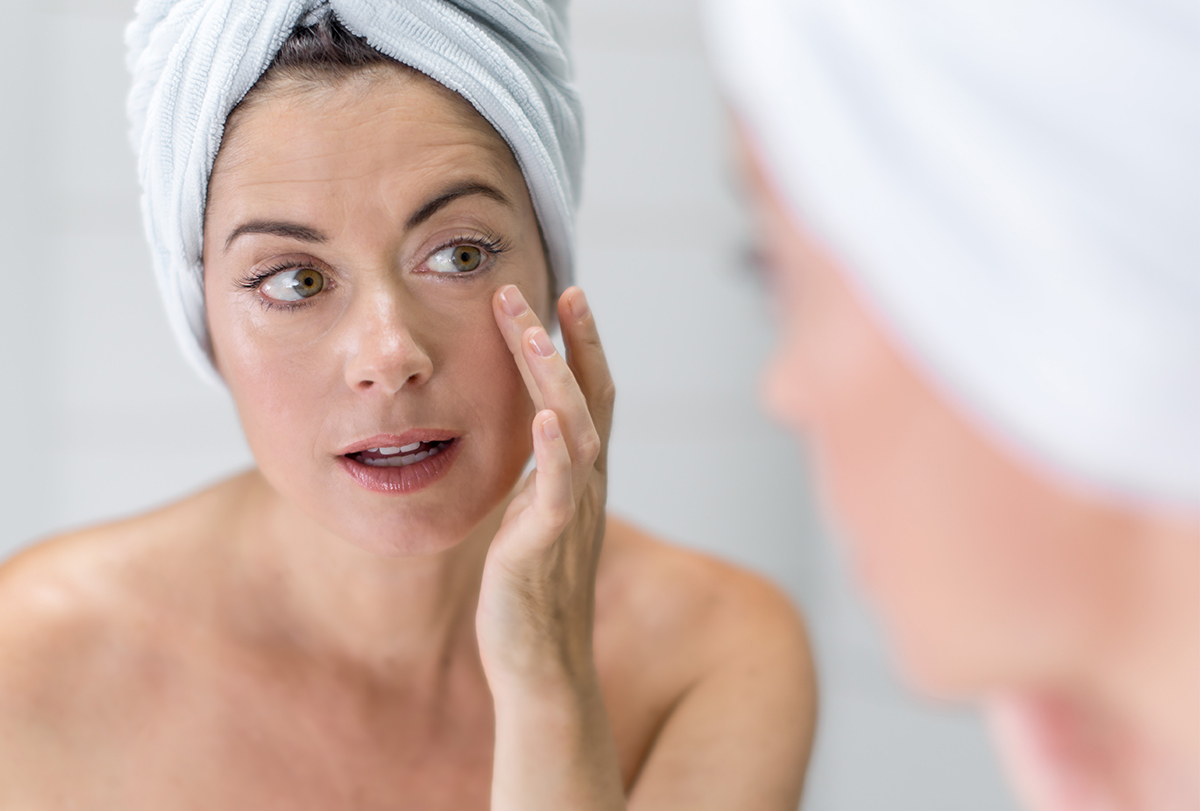
Several self-care measures and home remedies can help improve and prevent saggy skin.
Home Remedies as Adjunct Therapies
You can find various products on the market that claim to “tighten up” loose skin. However, you should know that no such product can get rid of extra skin.
Instead, you may try home remedies that help stimulate collagen and elastin synthesis to increase skin firmness.
These remedies are backed by a few scientific studies and may be used in conjunction with the primary treatment.
1. Use OTC creams and lotions
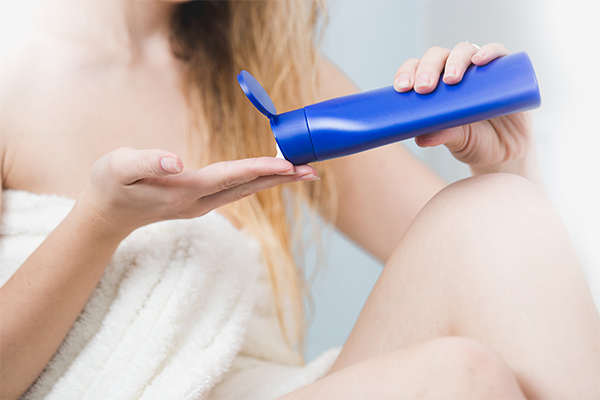
Certain OTC creams and lotions containing vitamin A, C, niacinamide, coenzyme Q10, hydroxy acids, collagen peptides, and grape seed extracts may help restore skin structure by improving collagen and elastin synthesis.
You can also try plant flavone-based creams containing genistein isoflavones to improve skin elasticity during menopause. (1)(2)(3)(4) These isoflavones can also be found in food sources, including soy milk, tofu, soy flour, miso, and tempeh.
2. Apply aloe vera gel
Aloe vera stimulates the fibroblast cells to produce elastin and collagen, thus improving skin structure. Moreover, it helps bind the epidermal cells and also tighten skin pores. (5)(6)
How to use: Apply fresh aloe vera gel to the skin, leave for 15 minutes, and wash with lukewarm water.
3. Dab some lemon
The ascorbic acid content of topical vitamin C is fully absorbed by the skin and is shown to boost collagen synthesis. (7)
How to use: Dab some diluted lemon juice on your skin using a clean cotton ball. Discontinue use if it burns your skin.
4. Use rosehip oil or supplements
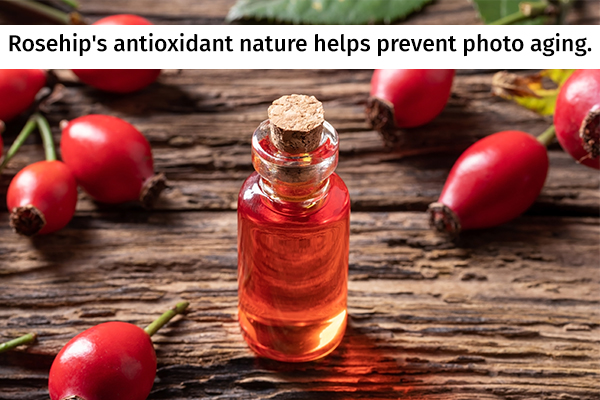
Rosehip contains high amounts of both vitamins A and C that help inhibit collagen breakdown and also improve collagen synthesis. (8) Moreover, its antioxidant nature helps prevent photoaging. (9)
Caution: Use supplements only upon consulting your doctor as it can have side effects such as sleep disturbance and abdominal cramps.
5. Consume cocoa flavanols
Cocoa flavanols possess photoprotective properties and also help improve skin elasticity. Studies have demonstrated that daily consumption of cocoa flavanols helps increase net skin elasticity. (10)(11)
It is recommended to consume around 25–30 g of dark chocolate each day.
6. Apply cinnamon
The topical use of cinnamon extracts is seen to stimulate collagen synthesis and reduce the appearance of wrinkles. (12)(13)
How to use: Mix 1 teaspoon of cinnamon with honey or coconut oil and apply the mixture to your ace. Wash it off with lukewarm after a few minutes.
Self-Care Measures to Deal With Saggy Skin
Along with home remedies, self-care measures must be observed to help manage saggy skin.
1. Modify your diet

Your diet can influence your skin structure and elasticity. Include the following nutrients in your daily meals:
- Protein: Your skin is mainly composed of protein, and thus its intake is necessary for maintaining skin structure.
- Omega-3: It can help build skin elasticity and increase collagen synthesis. You can consume bone broth as an omega-3 oil source.
- Vitamin C: As mentioned, vitamin C helps collagen synthesis. You may consume citrus fruits and supplements for the same. (14) Vitamin C consumption also helps improve levels of hyaluronic acid in the body, which is essential for skin firmness and health. (15)(16)
- Lysine: This essential amino acid is involved in the production of collagen. (17) It can be found in foods such as leek, tomatoes, avocados, dried apricots, green peppers, cods, eggs, fenugreek seeds, and sardines. You may also take supplements upon consulting your doctor.
- β-Carotene: It is a natural photoprotective agent found in carrots, spinach, pumpkin, sweet potato, squash, turnip greens, and cantaloupe. (16)
2. Practice resistance training
Exercising, especially after a weight loss surgery, can help prevent skin sagging. Exercise helps by building lean muscle mass, which can help fill out your skin. (18)
3. Exercise your facial muscles
Exercising your facial muscles for extended periods can help tighten the skin. These exercises target the muscles in the neck, chin, jowl, and jaws and may help in muscle development. (19)
4. Massage the skin
The mechanical stress associated with massaging the skin can stimulate protein synthesis. This helps stiffen the skin and provides an antiaging effect. (20) You can massage your skin with olive oil or coconut oil. You may also try using massage devices along with vitamin A-based lotions.
5. Use a scrub
A scrub not only helps remove impurities from your skin, but it also stimulates blood flow in the area. You can use salt, sugar, or oatmeal scrubs for this purpose.
6. Use chemical peels
Facial chemical peels can help promote the growth of new skin cells, thus helping manage wrinkles and photoaging. (21) However, it is best to consult a dermatologist before using a chemical peel.
7. Take help of devices
Certain jade rollers and radiofrequency devices can help in skin tightening, facial rejuvenation, and collagen production. (22)(23)(24)
8. Quit smoking and limit your alcohol intake
Smoking and alcohol consumption can contribute to skin aging, which can lead to skin sagging. (25)
9. Use compression clothing
Compression clothing applies moderate pressure on your skin and holds it in place to help reduce rubbing.
Preventing Saggy Skin
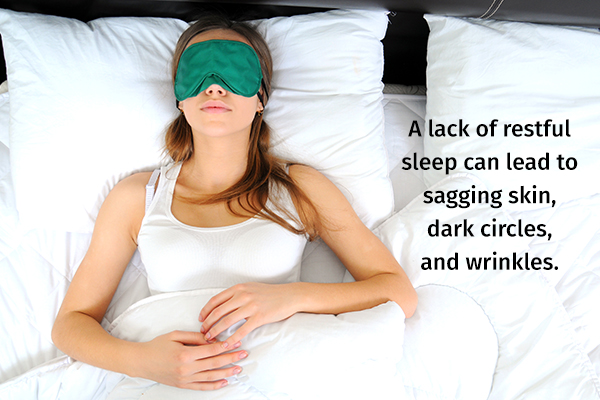
You cannot stop natural skin aging, but you can take measures to control environment-caused skin sagging.
1. Get proper sleep
It is advised to get around 7–9 hrs of sound sleep every day. (26) A lack of restful sleep can lead to saggy skin, dark circles, and wrinkles.
2. Take good care of your skin
Make sure to follow a healthy skincare routine. Cleanse your face before bed using a mild cleanser and pat your skin dry. Then, apply a moisturizer to help keep the skin hydrated. During the day, use powder to help reduce chafing of the skin.
3. Maintain proper hydration
Drink plenty of water throughout the day to help improve skin elasticity and general health. (27) You can also consume juices to meet your fluid requirements. Avoid dehydrating drinks such as tea, coffee, and alcohol.
4. Apply sunscreen
The UV rays in sunlight are the primary causes of skin aging. Therefore, to prevent saggy skin, apply a sunscreen of at least 30 SPF before stepping out of your home. (28)
5. Maintain your weight
Sudden weight loss can contribute to saggy skin. Therefore, if you are looking to lose weight, do it gradually.
Most-Asked Questions About Saggy Skin
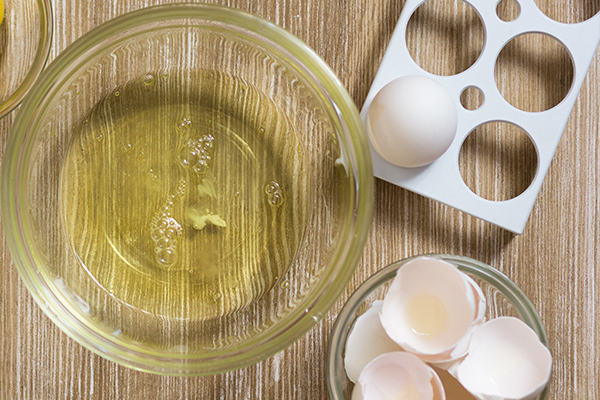
Does an egg white mask helps in tightening saggy skin?
Egg whites may temporarily help tighten the skin, but the effect may wear off soon. Moreover, this remedy is not supported by any scientific evidence.
Are witch hazel creams effective for tightening loose skin?
Witch hazel is an antiseptic agent and helps in wound healing. It is not studied whatsoever for its effects on collagen synthesis or skin elasticity.
Is avocado oil good for treating saggy skin?
The topical application of avocado oil is observed to help collagen synthesis in animal studies. However, its oral intake is not recommended as it can cause liver fibrosis. (29)
Final Word
Loose, saggy skin is often not desirable due to its appearance. It also increases the risk of rashes and infection. Therefore, it may be helpful to use medical treatments and self-care measures to tighten the skin.
You can also try home remedies as an adjunct upon consulting your doctor. Moreover, taking preventive measures can help delay aging and sagging of the skin.

- Was this article helpful?
- YES, THANKS!NOT REALLY


